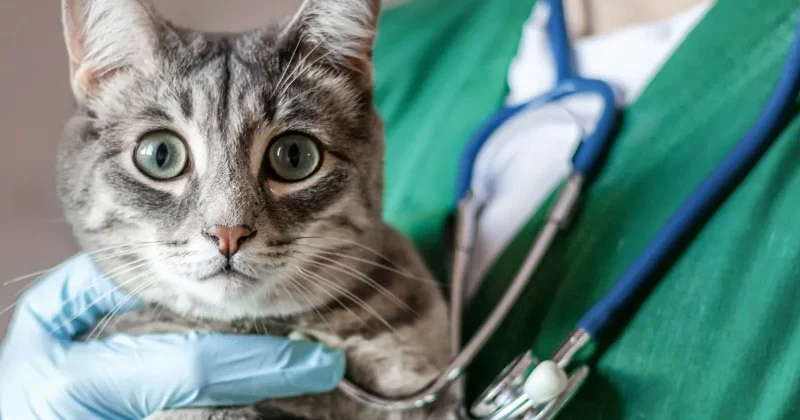
- The Most Common Health Issues in Cats
- Preventive Care Tips for Cats
- How to Recognize Health Issues in Cats Early
- Best Care Practices to Keep Your Cat Healthy
1. The Most Common Health Issues in Cats
Cats, like any other pets, can suffer from a range of health issues throughout their lives. Being a responsible cat owner involves understanding these issues and knowing how to prevent them. Some of the most common health problems include:
1.1 Fleas and Ticks
Fleas and ticks are common external parasites that can cause significant discomfort for your cat. They can lead to itching, inflammation, and, in severe cases, infections. Regular flea and tick prevention is crucial to ensure your cat stays comfortable and free from parasites.
1.2 Obesity
Obesity is a growing problem in domestic cats, especially in indoor cats. It leads to other serious health problems, including diabetes, arthritis, and heart disease. Providing proper portion control and regular exercise can prevent your cat from becoming overweight.
1.3 Urinary Tract Infections (UTI)
Cats, particularly male cats, are prone to urinary tract infections (UTIs) or urinary blockages. Symptoms may include frequent urination, blood in the urine, or straining to urinate. Ensuring that your cat has a clean litter box and is well-hydrated can help prevent these infections.
1.4 Dental Disease
Dental disease is very common in cats and can lead to serious problems like tooth loss or systemic infections. Regular brushing, dental check-ups, and providing dental-friendly food can prevent this issue.
1.5 Respiratory Infections
Respiratory infections in cats are often caused by viruses, bacteria, or environmental irritants. Symptoms can include sneezing, nasal discharge, and coughing. Keeping your cat indoors and ensuring they are up to date on their vaccinations can reduce the risk of respiratory infections.
2. Preventive Care Tips for Cats
Preventive care is essential in maintaining your cat’s health and preventing common illnesses. Here are some tips to help ensure your cat stays healthy:
2.1 Regular Veterinary Check-ups
Taking your cat to the vet for regular check-ups is one of the best ways to catch health issues early. Annual exams, along with vaccinations and parasite prevention treatments, can go a long way in keeping your cat healthy.
2.2 Healthy Diet
A balanced diet is essential for your cat’s well-being. High-quality cat food with the right proportions of protein, fats, and carbohydrates will keep your cat’s immune system strong and help prevent obesity. Avoid overfeeding and always provide fresh water.
2.3 Grooming
Regular grooming is necessary, especially for long-haired cats. Brushing your cat’s fur regularly helps prevent matting, reduces shedding, and also gives you an opportunity to check for signs of parasites or skin problems.
3. How to Recognize Health Issues in Cats Early
Recognizing health problems early can make a huge difference in treatment outcomes. Here are a few signs to watch for:
3.1 Behavioral Changes
Cats are creatures of habit, so any changes in their behavior, such as hiding more often, avoiding food, or aggression, can be signs of illness. Pay attention to these changes and seek veterinary care if necessary.
3.2 Changes in Appetite or Thirst
A sudden increase or decrease in appetite or thirst could indicate an underlying issue, such as diabetes or kidney disease. If your cat suddenly starts eating more or less, or drinking excessive water, it’s important to consult a vet.
3.3 Lethargy
If your cat is unusually tired or less active, it could be a sign of illness. Lethargy can be caused by various issues, from infections to chronic conditions like arthritis or heart disease.
3.4 Vomiting or Diarrhea
Occasional vomiting or diarrhea might be normal, but if these symptoms persist, it could point to a gastrointestinal problem or food intolerance. Monitor your cat’s symptoms and consult a vet if necessary.
4. Best Care Practices to Keep Your Cat Healthy
In addition to preventive care, adopting the following best practices will keep your cat in top shape:
4.1 Indoor Environment
Keeping your cat indoors reduces the risk of infections, parasites, and accidents. If your cat does go outside, consider providing them with a safe outdoor enclosure or supervised outdoor time.
4.2 Hydration
Cats can be prone to urinary problems, so ensuring they stay hydrated is essential. Make sure your cat has access to fresh water at all times, and consider adding wet food to their diet to increase fluid intake.
4.3 Stress Reduction
Stress can negatively affect your cat’s health, leading to behavioral changes and even physical illnesses. Make sure your cat has a calm, comfortable environment and provide opportunities for play and mental stimulation.
For more tips on keeping your cat healthy and happy, or to find the best pet products, visit Omnia Pet to get the best recommendations.









 Hollywood Feed4.0 (184 reviews)
Hollywood Feed4.0 (184 reviews) Brew Biscuits5.0 (2 reviews)
Brew Biscuits5.0 (2 reviews) All Friends Animal Hospital4.0 (446 reviews)
All Friends Animal Hospital4.0 (446 reviews) Kittylandkittens LLC0.0 (0 reviews)
Kittylandkittens LLC0.0 (0 reviews) Village Animal Clinic4.0 (212 reviews)
Village Animal Clinic4.0 (212 reviews) Rift Lake Aquatics4.0 (165 reviews)
Rift Lake Aquatics4.0 (165 reviews) Understanding Pet Insurance: What Does It Actually Cover?
Understanding Pet Insurance: What Does It Actually Cover? How to Keep Your Kitten's Eyes Clean and Free of Discharge
How to Keep Your Kitten's Eyes Clean and Free of Discharge The Truth About Heartworm Disease: Prevention is Cheaper Than Cure
The Truth About Heartworm Disease: Prevention is Cheaper Than Cure Why Is My Kitten's Belly Button Showing? | Omnia Pet
Why Is My Kitten's Belly Button Showing? | Omnia Pet Why Does My Cat Bite Me Gently? Love Bites Explained
Why Does My Cat Bite Me Gently? Love Bites Explained How to Stop Your Kitten from Getting into Cabinets
How to Stop Your Kitten from Getting into Cabinets